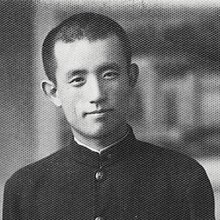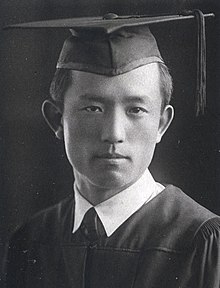This article has multiple issues. Please help
improve it or discuss these issues on the
talk page. (
Learn how and when to remove these template messages)
|
Yun Dong-ju | |
|---|---|
 Yun in 1942 | |
| Born | 30 December 1917 Lung-ching, Chi-lin, Republic of China |
| Died | 16 February 1945 (aged 27) Fukuoka Prison, Fukuoka, Empire of Japan |
| Resting place | Longjing, Jilin, China |
| Occupation | Poet |
| Language | Korean |
| Nationality | Republic of Korea |
| Education | Yonhi College |
| Alma mater |
Rikkyo University (dropped out) Doshisha University (expelled) |
| Genre | Poem |
| Notable works | 《하늘과 바람과 별과 詩》(Sky, Wind, Star and Poem) |
| Korean name | |
| Hangul | 윤동주 |
| Hanja | |
| Revised Romanization | Yun Dongju |
| McCune–Reischauer | Yun Tongju |
| Art name | |
| Hangul | 해환 |
| Hanja | |
| Revised Romanization | Haehwan |
| McCune–Reischauer | Haehwan |
| Website | |
|
yoondongju | |
Yun Dong-ju or Yoon Dong-ju ( Korean: 윤동주, Korean pronunciation: [jundoŋdʑu]; 30 December 1917 – 16 February 1945) was a Korean poet. He is known for his lyric poetries and for his poems dedicated to the Korean independence movement against the Empire of Japan.
Yun was born in Longing, Jilin, China. [1] After studying at the Myeongdong School, he moved to Pyongyang and graduated from Soongsil Middle School (now Soongsil High School in Seoul[ clarification needed]). He later moved to Seoul and attended Yonhi College. During his second year at Yonhi College, he published a poem in the boy magazine, and officially appeared in the paragraph. After crossing over to Japan, he entered Kyoto Doshisha University in 1942 but was arrested by the Japanese police for alleged anti-Japanese movements in 1943. While imprisoned in a Fukuoka, he died at the age of 27, leaving over 100 poems. His cause of death in Fukuoka prison is uncertain, but theories have been raised based on accounts of saltwater injections and medical experiments performed at that prison. His book, The Sky, the Wind, the Stars, and the Poem (하늘과 바람과 별과 詩), was published posthumously.
He was recognized as one of the conscientious intellectuals in the latter half of the Japanese colonial period, and his poems were based on criticism and self-reflection of the Japanese colonial government and the Joseon Governor-General. His friend and cousin, Song Mong-gyu, was also arrested while trying to join the independence movement and was classified as a subject of Japanese experimentation in Japan. While in Japan, he adopted the Japanese name, Hiranuma (平沼). In addition to his Korean name, the nicknames Dongju and Yunju were also used.
Biography

Yun Dong-ju was born as the eldest son among the four children of his father Yun Yeong-seok and his mother Kim Yong at Mingdong village (also known as Myeongdong-chon) in Longjing, where many Korean settlers in China lived during the Japanese occupation of Korea. As a child, he was called "Haehwan" (해환, 海煥 [hɛːhwan]). He entered Eunjin Middle School in Longjing in 1932 and moved to Pyeongyang to attend Soongsil Middle School in 1936. When the school was closed down in the same year he moved back to Longjing. [1] On 27 December 1941, aged 23, he graduated from Yonhi College, in Seoul which later became Yonsei University.[ citation needed]
He had been writing poetry from time to time and chose 19 poems to publish in a collection he intended to call "Sky, Wind, Star, and Poem" (하늘과 바람과 별과 시), [2][ unreliable source?] but he was unable to get it published.
After crossing over to Japan, entering Kyoto Doshisha University in 1942, arrested by the Japanese police for an independence movement in 1943, imprisoned in a Fukuoka prison, leaving over 100 poems and died in prison at the age of 27. The view that the signing of the Japanese saltwater Vivo and after his death the Japanese by Maruta is uncertain, but raising theories, biological experiments.[ citation needed]
Legacy
In 1948 three collections of his handwritten manuscripts were published posthumously as "The Heavens and the Wind and the Stars and Poetry" (Haneulgwa Baramgwa Byeolgwa Si). With the appearance of this volume Yun came into the spotlight as a Resistance poet of the late occupation period. [1]
In November 1968, Yonsei University and others established an endowment for the Yun Tong-ju Poetry Prize. In 2007, he was listed by the Korean Poets' Association among the ten most important modern Korean poets. [3]
Work
The Literature Translation Institute of Korea summarizes Yun's contributions to Korean literature:
- Yun’s poetry is notable for the childlike persona of his narrators, sensitive awareness of a lost hometown, and an unusual scapegoat mentality deriving from a sense of shame at not being able to lead a conscientious life in a period of gloomy social realities. "Life and Death" (Salmgwa jugeum) is representative of the poems dating from 1934 to 1936, his period of literary apprenticeship. It describes the conflict between life and death, or light and darkness, but its poetic framework is more or less crude. From 1937 onwards, however, his poems reveal ruthless introspection and anxiety about the dark realities of the times. The poems of this later period reach clear literary fruition in terms of their reflection on the inner self and their recognition of nationalist realities, as embodied in the poet's own experiences. In particular, they evince a steely spirit that attempts to overcome anxiety, loneliness, and despair and to surmount contemporary realities through hope and courage. [1]
Collection of poems
- New Myeong-dong
- Another Hometown
- Sky, Wind, Star, and Poem
- Those Who love the stars
- One Night I Count the Stars
etc...
Sky, Wind, Star and Poem
In January 1948, 31 of his poems were published by Jeongeumsa (정음사, 正音社), together with an introduction by the fellow poet Chong Ji-yong; this work was also titled Sky, Wind, Star, and Poem (하늘과 바람과 별과 시). His poetry had a huge impact. In 1976, Yun's relatives collected his other poems and added them to a third edition of the book. The poems that are in this edition (116 in total) are considered to be most of Yun's works.[ citation needed]
In a 1986 survey, he was selected as 'the most popular poet amongst the youth' [4] and his popularity continues to this day.[ citation needed]
2003. "SKY, WIND, AND STARS", the first English translation of Yun's complete poetic works was published by the Asian Humanities Press of Fremont, CA, in the U.S.A. The translators: Kyung-Nyun Kim Richards(김경년), Steffen F. Richards. The translation and the publication were supported in part by the Grants from KLTI(한국문학번역원) and the Institute of Korean Literature and Arts(문예진흥재단) [ citation needed]
2020, Korean-American Byun Man-sik translated Yoon Dong-ju's representative poems as Yoon Dong-ju: Selected Poems into English. [5]
In popular culture
In Lee Jung-myung's novel The Investigation (the title of the English translation of original Korean novel) is, inter alia, "an imaginative paean to" Yun. [6]
In 2007, Yun Dongju is recited by "Sam", on South Korean television series " I Am Sam (TV series)", in episode 13. [7]
In 2011, Yun Dong-ju Shoots the Moon, a musical based on his life, was performed by the Seoul Performing Arts Company. [8]
The movie DongJu: The Portrait of a Poet was released in February 2016. It depicts the lives of Yun Dong-ju and Song Mong-gyu in the setting of the Japanese colonial era. [9] Yun is portrayed by actor Kang Ha-Neul. Several theaters screened the movie with English subtitles. [10]
On 31 December episode of Infinite Challenge featured the climax of the history and hip-hop, Kwanghee and Gaeko featuring Oh Hyuk from Hyukoh performed song title "Your Night" inspired from Yun Dong-ju life and poet. [11]
On 30 December 2010, [12] Google Doodle celebrated the Birthday of Yun Dong-ju. [13]
See also
References
- Yu, Jong-ho (1996). "Yun, Tong-ju". Who's Who in Korean Literature. Seoul: Hollym. pp. 554–555. ISBN 1-56591-066-4.
- Choi, Dong-Ho. 2002. "A Study of Intertextuality between Yoon Dong Ju's 'Another Hometown' and Lee Sang's 'The Lineage': Centering on the Poetic Word 'the Skeleton'," Journal of the Research Society of Language and Literature 39: 309–325. [in Korean]
References
- ^ a b c d ""Yoon Dongju" LTI Korea Datasheet available at LTI Korea Library or online at: "Author Database : Yoon Dongju - Korea Literature Translation Institute". Archived from the original on 14 December 2013. Retrieved 14 December 2013.
- ^ https://www.facebook.com/pages/English-Translation-of-Yoon-Dong-Ju/389773294463952 [ user-generated source]
- ^ Chung, Ah-young (15 October 2007). "Top Ten Korean Modern Poets Selected". The Korea Times. Retrieved 15 February 2020.
- ^ "네이버 뉴스 라이브러리".
- ^ "구순의 재미동포 변만식 씨 '윤동주 시' 영어번역판 출간". Yobhap. 28 May 2020.
- ^ Kim Young-jin, 2024, book review of The Investigation, p. 17, The Korea Times, 12–13 April.
- ^ I am Your Teacher | 아이 엠 샘 - Ep.13, retrieved 17 March 2021
- ^ "Poet Yun Dong-ju's tale goes global in mystery novel".
- ^ "DONGJU; The Portrait of A Poet (2016)". www.koreanfilm.or.kr. Archived from the original on 25 March 2016.
- ^ "Theaters to screen "Dong-Ju" with English subtitles". The Korea Herald. 22 March 2016. Retrieved 22 March 2019.
- ^ "Infinite Challenge Recap: Episode 513 - Korean Variety Recaps". Korean Variety Recaps. 1 January 2017. Retrieved 10 April 2017.
- ^ Desk, OV Digital (30 December 2022). "30 December: Remembering Yun Dong-ju on Birth Anniversary". Observer Voice. Retrieved 30 December 2022.
- ^ "Birthday of Yun, Dong-ju". www.google.com. Retrieved 30 December 2022.
External links
- 1917 births
- 1945 deaths
- Korean Presbyterians
- Korean independence activists
- Literature of Korea under Japanese rule
- Korean male poets
- Prisoners who died in Japanese detention
- Korean people who died in prison custody
- 20th-century Korean poets
- Yonsei University alumni
- Rikkyo University alumni
- Doshisha University alumni
- 20th-century male writers
- Papyeong Yun clan
- Korean expatriates in China